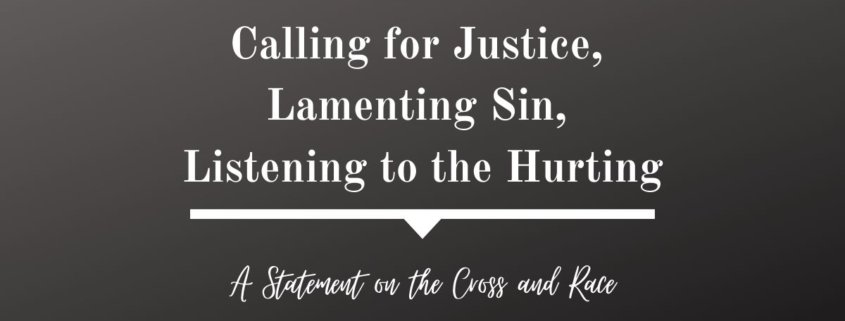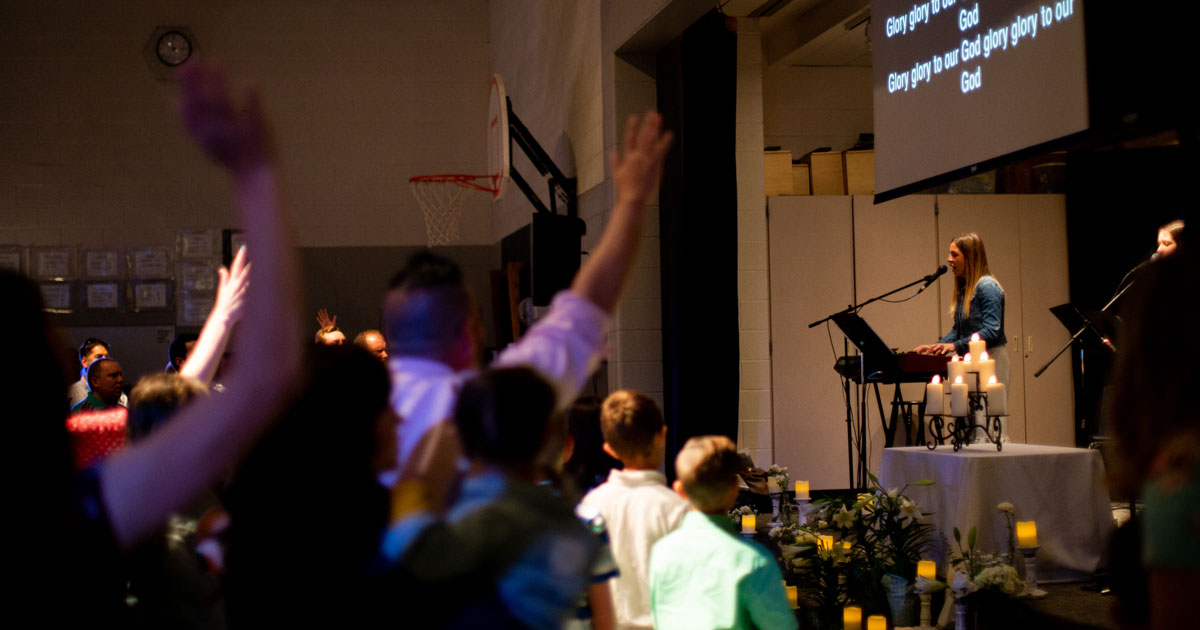
06|2020
How long, O Lord? Will you forget me forever? How long will you hide your face from me? How long must I take counsel in my soul and have sorrow in my heart all the day? How long shall my enemy be exalted over me? —Psalm 13:1-2
It moments of cultural upheaval and crisis we desire answers and search for the right words to say. As the events of the past week have shown us, however, it is precisely moments of crisis and upheaval where answers seem elusive and words feel inadequate. Yet, as our church has been reminded through our study of 1 Corinthians, the power of the Gospel is seen in the vulnerability and atrocity of the cross. The cross is where the power structures of the world collided with the creator of the world and the innocent victim became the triumphant victor. So, in the midst of searching for how to respond and what to say we want to say, with the Apostle Paul,
“For I decided to know nothing among you except Jesus Christ and him crucified.And I was with you in weakness and in fear and much trembling,and my speech and my message were not in plausible words of wisdom, but in demonstration of the Spirit and of power,so that your faith might not rest in the wisdom of men but in the power of God.” (1 Cor. 2:2-5)
As we rest in the power of God seen in the triumph of the cross, we want to do three things as a church: 1. Call for justice, 2. Lament the effects of sin, 3. Listen to those who are hurting.
1. Calling For Justice
The call for justice was beautifully and eloquently made by our church’s network, Acts 29, in the document, A Call To Justice, Restoration, and Renewal. As our church stands in agreement with what it says, we encourage you to read and wrestle with the truths it communicates.
Wrestling with this document must involve more than a simple reading or a bland affirmation. It means we must confront areas of our hearts that require repentance. Repentance of judgmental attitudes, arrogant indifference, and in some cases, silent racism. Calling for justice as a church means we need to be willing to stand with and for our brothers and sisters in Christ who have too often felt the evangelical church is a passive bystander in the work of seeing Christ’s Kingdom come on earth as it is in heaven.
The triumph of the cross means that we call for justice in the shadow of the most unjust act in human history—the crucifixion, knowing that just as Jesus defeated sin and death He will one day defeat all sin, evil, and oppression.
2. Lamenting The Effects of Sin
The practice of lament is one that, in God’s grace, we became more acquainted with this past year as we studied the book of Lamentations and several lament psalms. We drew heavily on the work of Mark Vroegop and his analysis of the biblical act of lament in his helpful book, Dark Clouds, Deep Mercy. As our nation grieves the events of this past week and the all too present effects of the sin of racism we want to faithfully turn to God through the four steps of lament we studied:
- Turn to God in prayer: There is no where else our country can find the hope and restoration we so desperately desire.
- Complain about the effects of sin and brokenness: The murder of a handcuffed man is yet another example of the pervasiveness of sin, and we must be righteously angry about the death of a fellow image bearer.
- Ask that God would move in this situation: Riots and conflict (as opposed to peaceful and just protest) are but the surface sin of the deeper need for God to work, we must humbly pray that God would bring healing, restoration, and justice.
- Trust God to remain true to Himself: God is a God of justice whose compassion is bent toward the oppressed and broken, may all the hurting find comfort in Him.
The sign of a heart transformed by Jesus is caring about the things He cares about. We have ample evidence from Scripture that God cares for the oppressed, broken, and marginalized. Whether or not we have experienced the effects of racial injustice, we show our love for Jesus by standing in unity with those He loves.
Again, the triumph of the cross means that we can lament the effects of sin and brokenness knowing that ultimate triumph is a hope deferred. Christ has demonstrated the power of the cross through the emptiness of the tomb, but while we await the consummation of His Kingdom we lament, grieve, and pray, as our persecuted brothers and sisters have throughout the ages, “Come Lord Jesus, come.”
3. Listening To Those Who Are Hurting
The truth for many in our church, myself included, is that we do not have the faintest idea of the hardship our African-American brothers and sisters have experienced. In my pride I think that I understand the pain the black community has experienced, but the truth is apart from relationship and conversation I don’t have a clue. Yet, in my pride I offer suggestions and solutions that are devoid of empathy and love. We all must heed the words of James,
Let every person be quick to hear, slow to speak, slow to anger;for the anger of man does not produce the righteousness of God.Therefore put away all filthiness and rampant wickedness and receive with meekness the implanted word, which is able to save your souls. —James 1:19b-21
For me personally my perspective on this issue changed radically over several years as I came to know and love my friend Brandon Washington and his wife. As I listened to his story, and heard with new ears the stories of other black men and women, I was broken over the pain that he has endured. A pain that my privilege had blinded me to.
As we grapple with what we can do to help this situation I believe the act of listening to those who are hurting is perhaps the most important step for our church in particular to take. The best place for conversations like this to begin is with those we know and love already. But as our church seeks to grow in empathy one thing I would strongly encourage all of us to do is watch these two videos linked below.
The first is a panel discussion from some of the leadership of Acts 29 (Scroll to the bottom of the page for the full video). It was recorded in 2016 after an event that stirred the same emotions that we are seeing now. While the entire thing is worth watching for the way it will help white Americans better understand a topic we know far too little about, the most impactful segment begins at 29:40, where one after another these five pastors share the encounters they had that shaped their experience with race. The truth is that these stories are foreign for most white Christians because we’ve never taken the time to listen, and in failing to listen we have failed to love.
The second is a sermon given at an Acts 29 conference that lays out not only the theology of reconciliation we see in the New Testament, but shows us how the Gospel must compel us to act for justice. In the words of my friend Brandon, “It is the church’s job to be the frontrunner in opposing injustice. Everyone else is trying to do it, but they are putting band-aids on bullet wounds. We have the Gospel.”
Please take the time to watch both videos as a step towards our church growing in love and empathy.
For us, the power of the cross means that we can listen without fear because when our guilt and indifference is confronted we know those sins, of what we have done and what we have left undone, have already been paid for by Jesus.
As we call for justice, lament the effects of sin, and listen to those who are hurting, our prayer is that missio Dei: Falcon would increasingly be a place where all people can experience the love of Jesus through the love of His people.
Categories:: Acts 29, Announcements, Resources

